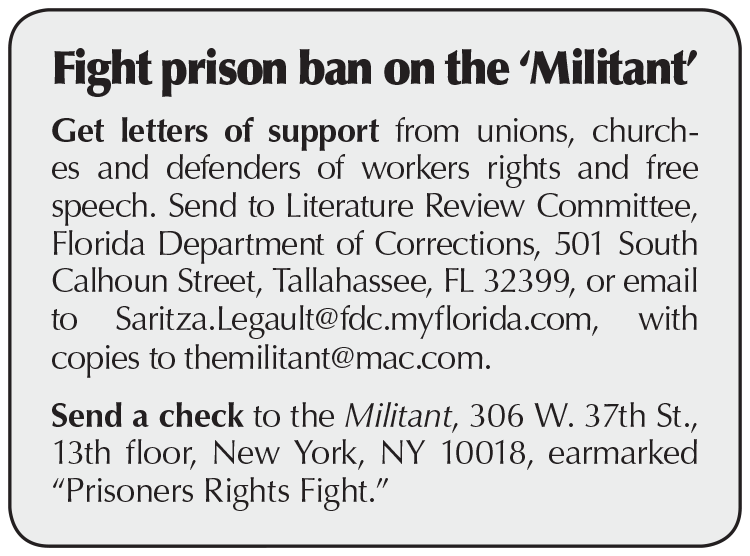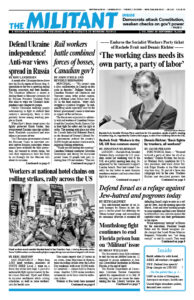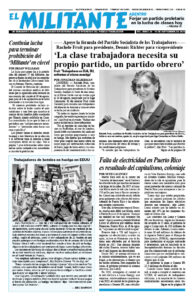The four-months-long fight continues to end the ban on Militant issue no. 17, imposed by prison authorities at Jackson Correctional Institution in Malone, Florida, at the end of April.
The Florida Department of Corrections Literature Review Committee upheld the impoundment at its July 18 meeting, but gave no reason for maintaining the ban. Library Services Administrator Saritza Legault informed Militant attorney David Goldstein of this decision Aug. 21, a full month after the meeting. She wrote that “the Publisher’s Appeal and all of the associated letters of support” will be reviewed at the committee’s next meeting, set for Aug. 29.
As we go to press, neither Goldstein nor the Militant have heard if the meeting was held or what was decided.
Upon learning of the impoundment in mid-May, Goldstein appealed. Since then dozens of letters from organizations and individuals have been sent urging the Literature Review Committee to overturn the ban.
“I have just read that you have recently upheld the ban on the Militant issue no. 17,” wrote August Nimtz, a professor of political science at the University of Minnesota, Aug. 27, “and without reason.”
The banned issue contained an article reprinting the opening chapter of Pathfinder’s latest book, The Fight Against Jew-Hatred and Pogroms in the Imperialist Epoch: Stakes for the International Working Class. Prison authorities also objected to one of the photos, an Associated Press picture widely printed in papers worldwide. It shows the body of a Jewish man murdered by Hamas during its Oct. 7 pogrom in Israel being driven around Gaza City to cheers by Islamist thugs and their supporters.
Jackson authorities wrote, “Picture shows dead person being paraded around on a motorcycle. Magazine depict hatred toward a specific race.” They then claimed the photo and the newspaper itself are “dangerously inflammatory,” encouraging “riot, insurrection, rebellion” and “organized prison protest.”
This “charge is unfounded,” wrote Nimtz. “A read of the article itself surrounding the photo reveals just the opposite. It’s actually a condemnation of what the photo shows.” He added, “If my students can read such articles, which I occasionally assign, then the incarcerated should have the same right.”
Prisoners’ constitutional rights
At issue is prisoners’ constitutional rights to read political literature of their choice, and freedom of the press — the right of the Militant and other publications to reach their subscribers behind bars.
Over the past decade Florida prison officials have tried to suppress issues of the Militant nearly 50 times. The paper challenges every ban and has won the vast majority.
“I respectfully urge you to rescind the ban on Militant no. 17,” wrote Jay Ressler, an artist from Hamburg, Pennsylvania, Aug. 27. “There is not one word in the banned issue that can possibly be construed as incitement to riot or violence as charged by Jackson officials. It is well known (and a matter of Federal Court findings) the Militant newspaper has a long record of counseling peaceful and legal methods of petition as guaranteed by the Constitution.”
From North Aurora, Illinois, Patricia Thompson wrote, “As one of millions of people who are trying to be a point of support for an incarcerated family member, I have been closely following the case of the Jackson Correctional Institution’s continued impoundment of the Militant newspaper issue no. 17.
“This newspaper consistently enlightens and educates and never ‘depicts hatred toward a specific race,’” she said, in urging the impoundment be ended.
Keep sending letters! See addresses in box below.


